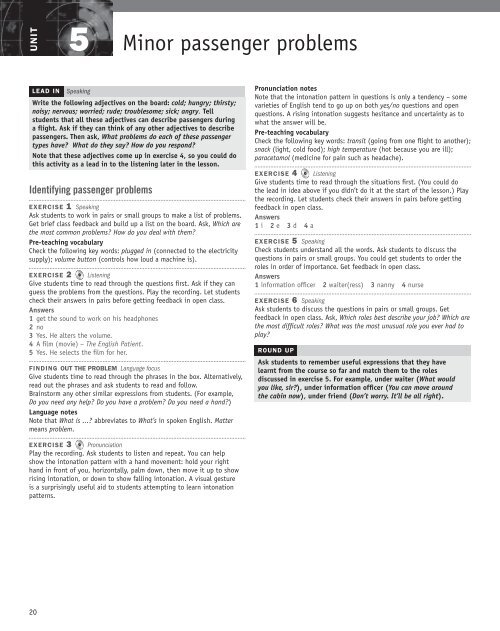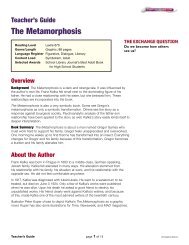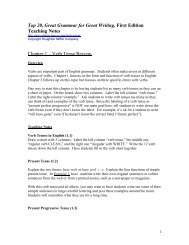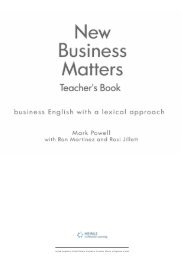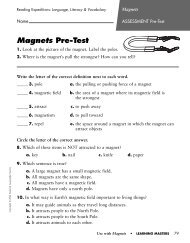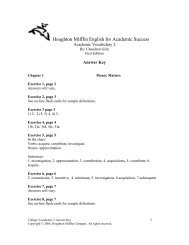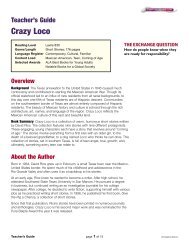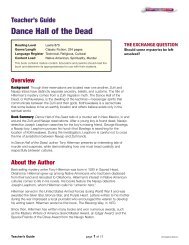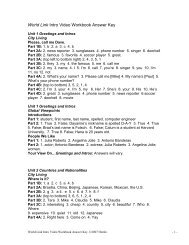English for Cabin Crew Trainer's Guide - Heinle
English for Cabin Crew Trainer's Guide - Heinle
English for Cabin Crew Trainer's Guide - Heinle
Create successful ePaper yourself
Turn your PDF publications into a flip-book with our unique Google optimized e-Paper software.
UNIT<br />
LEAD IN Speaking<br />
5 Minor passenger problems<br />
Write the following adjectives on the board: cold; hungry; thirsty;<br />
noisy; nervous; worried; rude; troublesome; sick; angry. Tell<br />
students that all these adjectives can describe passengers during<br />
a fl ight. Ask if they can think of any other adjectives to describe<br />
passengers. Then ask, What problems do each of these passenger<br />
types have? What do they say? How do you respond?<br />
Note that these adjectives come up in exercise 4, so you could do<br />
this activity as a lead in to the listening later in the lesson.<br />
Identifying passenger problems<br />
EXERCISE 1 Speaking<br />
Ask students to work in pairs or small groups to make a list of problems.<br />
Get brief class feedback and build up a list on the board. Ask, Which are<br />
the most common problems? How do you deal with them?<br />
Pre-teaching vocabulary<br />
Check the following key words: plugged in (connected to the electricity<br />
supply); volume button (controls how loud a machine is).<br />
EXERCISE 2 Listening<br />
Give students time to read through the questions fi rst. Ask if they can<br />
guess the problems from the questions. Play the recording. Let students<br />
check their answers in pairs be<strong>for</strong>e getting feedback in open class.<br />
Answers<br />
1 get the sound to work on his headphones<br />
2 no<br />
3 Yes. He alters the volume.<br />
4 A fi lm (movie) – The <strong>English</strong> Patient.<br />
5 Yes. He selects the fi lm <strong>for</strong> her.<br />
FINDING OUT THE PROBLEM Language focus<br />
Give students time to read through the phrases in the box. Alternatively,<br />
read out the phrases and ask students to read and follow.<br />
Brainstorm any other similar expressions from students. (For example,<br />
Do you need any help? Do you have a problem? Do you need a hand?)<br />
Language notes<br />
Note that What is ...? abbreviates to What’s in spoken <strong>English</strong>. Matter<br />
means problem.<br />
EXERCISE 3 Pronunciation<br />
Play the recording. Ask students to listen and repeat. You can help<br />
show the intonation pattern with a hand movement: hold your right<br />
hand in front of you, horizontally, palm down, then move it up to show<br />
rising intonation, or down to show falling intonation. A visual gesture<br />
is a surprisingly useful aid to students attempting to learn intonation<br />
patterns.<br />
20<br />
Pronunciation notes<br />
Note that the intonation pattern in questions is only a tendency – some<br />
varieties of <strong>English</strong> tend to go up on both yes/no questions and open<br />
questions. A rising intonation suggests hesitance and uncertainty as to<br />
what the answer will be.<br />
Pre-teaching vocabulary<br />
Check the following key words: transit (going from one fl ight to another);<br />
snack (light, cold food); high temperature (hot because you are ill);<br />
paracetamol (medicine <strong>for</strong> pain such as headache).<br />
EXERCISE 4 Listening<br />
Give students time to read through the situations fi rst. (You could do<br />
the lead in idea above if you didn’t do it at the start of the lesson.) Play<br />
the recording. Let students check their answers in pairs be<strong>for</strong>e getting<br />
feedback in open class.<br />
Answers<br />
1 i 2 e 3 d 4 a<br />
EXERCISE 5 Speaking<br />
Check students understand all the words. Ask students to discuss the<br />
questions in pairs or small groups. You could get students to order the<br />
roles in order of importance. Get feedback in open class.<br />
Answers<br />
1 in<strong>for</strong>mation offi cer 2 waiter(ress) 3 nanny 4 nurse<br />
EXERCISE 6 Speaking<br />
Ask students to discuss the questions in pairs or small groups. Get<br />
feedback in open class. Ask, Which roles best describe your job? Which are<br />
the most diffi cult roles? What was the most unusual role you ever had to<br />
play?<br />
ROUND UP<br />
Ask students to remember useful expressions that they have<br />
learnt from the course so far and match them to the roles<br />
discussed in exercise 5. For example, under waiter (What would<br />
you like, sir?), under in<strong>for</strong>mation offi cer (You can move around<br />
the cabin now), under friend (Don’t worry. It’ll be all right).


